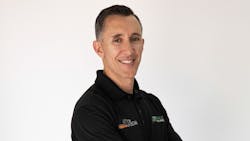In the inaugural July 2012 issue of Ratchet+Wrench, Brian Sump told writer Bryce Evans in his story, “Driven to be the Best”: I’m a competitive person, a really competitive person. Everything I do, I want to be the best that I can.
We call that champion mindset, and it’s characterized by a dogged determination to achieve the goals purposed within the heart and mind. Sump’s story in Volume 1, Issue 1 read like the manifesto of a man destined to attack the auto industry with the same vigor that earned him a scholarship to the Colorado School of Mines—a top engineering school in Golden, Colorado—and that eventually a landed him a five-year professional football career in the AFL and the NFL (Chargers and Rams, if you’re curious).
Sump’s confidence and determination—and his love of German cars—got him into the auto industry, first as an employee with Avalon Motorsports and eventually as its owner in 2007 when, using “a bit of savings and just a $15,000 loan," he purchased the company. By 2015, Sump purchased a second shop, Urban Auto Care, which today has four locations in metro Denver.
Ten years after his first interview with Ratchet+Wrench, Sump’s drive, thought leadership, and enthusiasm continues to influence the automotive repair industry. In this story, written in an “in my own words” format, Sump guides shop owners on how to level their shops up from average to amazing.
On Specializing
I followed a passion for German cars. When we started Avalon Motorsports, we sold performance parts for German cars, so we stayed in that vein. We were already well versed in German import brands and the fact that we knew the performance aspect of it made a natural segue into service and repair.
I wouldn't say a passion for a certain vehicle make can lead you to success (we already had an existing marketplace set up), [but] I believe there's a case for specialization when you can become an expert and the go-to source for certain makes and models. You can build a market.
On Premium Positioning
We try to be careful with what we promise. We under-promise and over-deliver. We stand behind what we say we're going to do. So we don't do a lot of discount marketing at Avalon Motorsports, but we do some offers for low-entry marketing at Urban Autocare.
If you're going to get clients to come in, you’ve got to figure out ways to do that. One way is through reputation and word-of-mouth and not offering discounts. Then there's lowering the barrier financially to [provide an] opportunity to work with your company. We give people a chance to work with us at a very low commitment.
If you're going to ramp up your brand quickly, then you're probably going to need to do some kind of discount marketing. If you're going to ramp up a high-quality, stable brand over time and not use discounts, you've got to provide value and make people feel excited to tell other people about you.
On Creating Shop Culture
Every company has a culture. Some are good, some are bad. The way I describe culture is how do [customers] feel when they're inside your business? How do your team members feel? We define ours by three Ps: people, process, profit. We prioritize it that way to make sure we get the right people.
Don’t tolerate mediocrity and bad attitudes. It's hard because there's a lack of skilled labor, so you almost feel like you have to deal with it. But you’ve got to draw a line in the sand and say, ‘We will not tolerate that—period.’ It’s going to hurt for a while, but the more you bring in the right people, and the more you keep the right people, you build and get bigger with the right people. It becomes a workplace where people feel uplifted; they feel developed, important, loved, and cared for, and are always going to treat your clients better.
[You can build culture by] having career advancement; removing glass ceilings; doing a lot of fun activities and sponsoring activities, whether it's 5k runs, golf tournaments, company barbecues and picnics, and fun Christmas parties. We do a bunch of different things. It breaks up the monotony.
“The reason we exist is to create an uplifting environment—the opposite of being let down.”
On Meeting Personal Needs
We’re passionate about developing our team members personally and professionally so, if they have a time of crisis, we can shine in that time. We're going to stand out to hopefully breed loyalty. [That starts by] having authentic relationships and friendships.
We had a team member who had somebody intrude into their apartment while they were there and threaten them with a weapon. They had no heat. You can't perform in that environment. So we got them out of there, gave them residence for a few days, and help them get into a new apartment.
We have chaplains who come around if our team members need emotional support, if they have a death in the family, or if their marriage is on the rocks. You help support them personally so that they can do their best. And then, of course, professional development is helping them progress in their career. I think that speaks for itself.
On Raising Up Leaders
I want to pour into people who want to grow, and some do and some don't. There are people out there with one, two, three, four shops, or five shops. I don't know how many can get past five without great leadership, but you can do one or two by yourself. Maybe you have a manager or two or a couple of advisors and a district manager, but to really grow healthy, you're going to have to start looking to develop a No. 2 in command.
[When choosing a leader], key things are trust, loyalty, and a consistent track record of performance. So when we look at somebody, we ask: Is this person highly trustworthy? Are they breeding trust every month or year? Are they loyal and committed and serving this organization? Their eyes aren't wandering to go somewhere else. If we teach something, does it get implemented? Do they practice what we preach? If they’re consistently doing those things and have the desire–-because we know we can control the how-to, but we cannot control the ability, nor can we control the desire–-and [if they have] the ability and fall into one of those three categories, or all three categories, you keep working with them and they keep growing. Then you build a pattern out of it and you wash, rinse, repeat.
On Growing to MSO
Ten years ago, I had one shop, and I had no interest in having more shops because all the multi-shop owners I know felt ridiculously stressed. I wanted no part of that. Today, we have five shops, and we're getting ready to do No. 6. That's a big change. I think our understanding of business has changed. I'd like to say it improved. We're applying knowledge and adapting as we go. I’ll say one important thing is the fact that we've grown to five locations and going on six and 10 years ago, it wasn't even in my sight.
What ended up happening is we were developing talent, and we started realizing that we can't have two managers in the same store. I had Phil, our director of operations, as the manager, and we had an up-and-coming gentleman named Adam, who was very talented. We got to where he either wanted an opportunity to grow and become a manager, or we might lose him. So, I said, ‘Well, I guess we've got to look at growing.’
We were actually looking at Avalon Motorsports No. 2 when the opportunity came along with Brent Wells and Autotailor. If we keep growing and cultivating talent, we have to find a way for them to grow. We want to be pushed to grow by that need to create opportunity.
“We’ve all been given God-given talents, and we've got to make the most of it. Cast a vision, look for opportunity.”
On the Future
We have a ridiculous opportunity, and I don't know that there's been an opportunity as ripe as we have right now in part to the lack of new vehicle sales and chip issues. This means that the average age of vehicles is increasing.
The lack of skilled labor is actually an opportunity because there are not enough techs in the industry, but there are enough techs for good shops. I'm on the board of Transformers Institute, and as we say in Transformers, “He who has the techs wins.” So, on one hand, you can look at the lack of technicians as a huge issue, but you can also look at it as an opportunity if you have the techs. Barriers to entry create opportunities. I think the industry is advancing, and I think the reputation of the industry is advancing. You have a chance to stand out against organizations that aren’t making progress if your organization looks and feels different, and you communicate differently. Where others are doing poorly, you have a chance to thrive and stand out in marketing.
I think the fact that EVs are coming is going to be a good opportunity. But I think the fact that we're going to have combustion and hybrid engines for the next 20-25 years, at least before full battery electric, means we have a really clear runway to grow.
I hope the writing's on the wall for people to see that things are going to change in our industry. It’s going to be disruptive. You have two options: You either ride as long as you can and die out or do you adapt and change. At some point, you're going to have to make a choice, and you may not be excited about where you end up.
I think being in a fragmented market is also a benefit because the consolidation hasn't happened here. Independent repair shops have a chance to thrive for a long time and not be drowned out by insurance contracts and other things that happened in the collision space.
When I look at it from that aspect, I feel really good about things.




